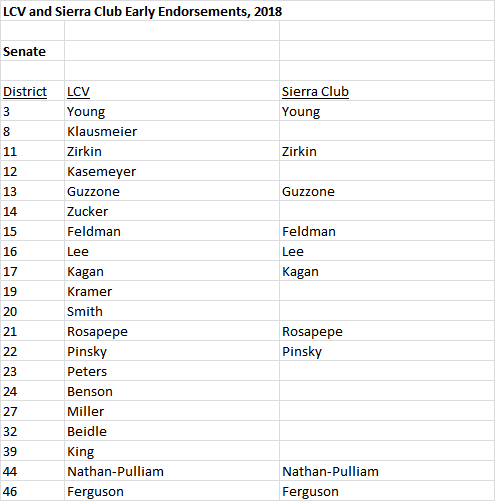The League of Conservation Voters (LCV) has authored an open sign-on letter (posted below) to Gov. Larry Hogan vehemently protesting major cuts in transit service and calling for more capital expenditures on transit.
The reality is that these cuts are just the start.
Due the economic devastation wrecked by the pandemic, revenues are down substantially. The federal government has shown no inclination thus far to help bail out the states, viewed as a “blue state” bailout by President Trump, so no money is coming from that source. The Maryland Constitution requires a balanced budget, requiring substantial cuts ahead. Gov. Hogan will not support a tax hike and there is little enthusiasm among Assembly Democrats either.
The drastically higher than expected costs for the Purple Line to the tune of over $750 million are about to suck even more funds away from other projects. The State has already indicated that the funds will come from other transit projects, like MARC. Even without the pandemic hit, the transit budget was set to take an enormous hit. The Washington Metro, unmentioned in the LCV letter, has already seen its funding cut.
The signatories to the open letter are notably a Baltimore heavy group. The absence of either Purple Line Now or the Action Committee for Transit, both staunch Purple Line supporters, from the letter signatories is perhaps telling. Both are normally easy gets for these sorts of letters but it tacitly recognizes the reality that the Purple Line will not be finished unless major cuts are made elsewhere.
Here is the LCV letter:
AN OPEN LETTER TO GOVERNOR LARRY HOGAN, MARYLAND TRANSPORTATION SECRETARY GREG SLATER, AND MARYLAND TRANSIT ADMINISTRATOR KEVIN QUINN:
Last week, the Maryland Department of Transportation and Maryland Transit Administration announced major cuts to the MTA system, including cutting bus service by 20%, reducing MARC, commuter local bus, and paratransit service, and cutting the MTA’s already strained six year capital budget for critical safety needs by $150 million. We, the undersigned, urge rejection of these cuts, which would be devastating to many Marylanders that live in low-income communities, communities of color, and people with disabilities.
Rather than take steps to relieve the strain of a veritable tsunami of challenges to Maryland’s most vulnerable communities, MTA’s plan would exacerbate residents’ difficulties and hobble the state’s recovery. TransitCenter found that 40% of transit commuters in Baltimore City and 35% of transit riders in the state work in essential job sectors, with hospital and health care workers being the largest share of riders. A large number of essential workers – nurses, grocery store workers, child care professionals, nursing care staff, and so many more – rely on public transit to get to their jobs. The proposed cuts would make it harder for these vital workers to get to their jobs, which would threaten their employment and exacerbate the devastation the pandemic has wrought to our economy. A shortage of these critical workers will also add strain to a healthcare system that is already spread too thin.
Maryland should be investing in more public transportation, not less. We should be increasing access to job centers from the communities most in need, not cutting it. We should be prioritizing cleaner transportation alternatives that reduce pollution and the health conditions that make marginalized communities especially vulnerable to the impacts of coronavirus and other respiratory illnesses like asthma. Vehicle emissions also create NOx that ultimately contributes roughly one-third of the nitrogen pollution to the region’s rivers, streams, and the Chesapeake Bay.
Among the problematic cuts to service, the proposed changes eliminate any route from Baltimore City (the jurisdiction with the highest reliance on public transportation) to Annapolis. Even in its current state, public transit to Annapolis is extremely limited, but at least it was available and provided mobility services. With the cuts, Annapolis would become inaccessible by public transportation, limiting the ability of many Marylanders to participate in our state’s Democracy. Public participation is always essential to a free and fair government, but never more so than in a crisis.
In reference to Maryland’s essential workers, the Maryland Transit Caucus has stated in their letter to the administration following the proposed cuts: We rely on them. They rely on MTA. We call on the administration to take immediate action. Funding from the Transportation Trust Fund should be allocated to public transit that benefits all Marylanders, rather than to highway expansion and construction projects that benefit only the wealthiest.
Signed,
- Maryland League of Conservation Voters
- Maryland Sierra Club
- Common Cause Maryland
- Clean Water Action
- Climate Law & Policy Project
- Safe Skies Maryland
- Maryland Legislative Coalition
- Maryland Consumer Rights Coalition
- Maryland Campaign for Human Rights
- Coalition for Smarter Growth
- Baltimore Transit Equity Coalition
- Transit Choices
- Central Maryland Transportation Alliance
- Maryland United for Peace and Justice
- Sunrise Movement Baltimore
- League of Women Voters Maryland
- Maryland Nonprofits
- Nuclear Information and Resource Service
- Labor Network for Sustainability
- Family League of Baltimore
- Bikemore
- Eastern Shore Land Conservancy
- Maryland Center on Economic Policy
- Job Opportunities Task Force
- NAACP Maryland State Conference
- Public Justice Center
- Our Revolution Maryland
- Indivisible Baltimore
- Indivisible Howard County
- Chesapeake Physicians for Social Responsibility
- Echotopia, LLC
- Maryland Conservation Council
- Ji’Aire’s Workgroup
- Indivisible Towson
- ATU Local 1300
- Food and Water Watch Action
- Chesapeake Bay Foundation
- Disability Rights Maryland
- Consumer Advocates for Ride Services
- Progressive Maryland
- Unitarian Universalist Legislative Ministry of Mary
- Showing Up for Racial Justice (SURJ) – Baltimore
- WISE Maryland
- Maryland Climate Justice WIng
- Takoma Park Mobilization Environment Committee
- Interfaith Partners for the Chesapeake
- Accessible Resources for Independence
- League for People with Disabilities
- Climate X-Change Maryland
- The Nature Conservancy – Maryland/DC Chapter
- Saltzberg Consulting
- Chesapeake Climate Action Network
- Sunrise Howard County
- Baltimore 350
- The Parent and Community Advisory Board, Baltimore City Public Schools
- Sunrise Rockville
- Marylanders for Patient Rights
- Bus Workgroup 14
- South Baltimore Community Land Trust
- Free Your Voice
- Represent Maryland
- Green Team at St. Vincent de Paul Church, Baltimore
- Baltimore People’s Climate Movement
- The Climate Reality Project: Baltimore Chapter


